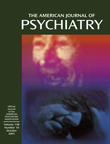Use of Alternative Medicine
To the Editor: Jürgen Unützer, M.D., M.P.H., et al. (1), in their survey of the use of alternative medicine, found, as have others, that people with major depressive disorder and panic disorder are particularly likely to seek alternative therapies. “Persons with high levels of psychological distress,” they suggest, “may be more likely to use a range of available treatments” (p. 1856). They also suggest that depressed and anxious patients may turn to alternative therapies because they are dissatisfied with conventional medical treatments.
All this may be true. But there is another explanation as well: alternative therapies are especially likely to benefit these people. With the possible exception of some of the botanicals, alternative therapies—certainly the wackier, biologically implausible ones—provide whatever benefit they do through the placebo effect. Major depressive disorder and panic disorder are highly placebo responsive and are, in fact, the mental disorders with the highest placebo response rates (30%–40% and 40%–50%, respectively). People with depression and panic disorder who turn to alternative therapies may do so because, for them, these therapies work.
1. Unützer J, Klap R, Sturm R, Young AS, Marmon T, Shatkin J, Wells KB: Mental disorders and the use of alternative medicine: results from a national survey. Am J Psychiatry 2000; 157:1851-1857Link, Google Scholar



